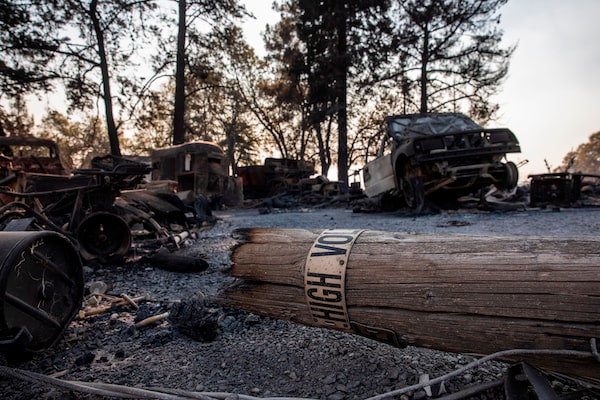
A fallen PG&E utility pole lays on a property burned during the Kincade Fire, along Highway 128 in Healdsburg, California on October 28, 2019. Keeping big cities in good working order costs money, as California is finding out.PHILIP PACHECO/AFP/Getty Images
When Vancouver Mayor Kennedy Stewart slammed the Conservatives on the eve of the federal election, many believed his words were impolitic at best, ignorant at worst.
“I’m worried that an Andrew Scheer Conservative government could be elected, and this would be a disaster for the city,” Mr. Stewart said five days before the vote.
In part, Mr. Stewart, a former NDP MP, was calling attention to the paucity of promises in Mr. Scheer’s platform to help big cities with transportation infrastructure and social housing – things we care about in Vancouver.
Until it fails, infrastructure is a word that makes most people’s eyes glaze over. But having just spent a week in the San Francisco Bay area, which was crippled by power shutdowns, I was struck by the importance of investing in this unsexy area. The shutdowns were a precautionary measure to reduce the risk of wildfires caused by downed power lines, endemic at this time of year when the Santa Ana winds blow.
My week in Oakland, Calif., was consumed by checking Pacific Gas and Electric’s website to see whether the hotel where I was staying would have power. I had brought a headlamp just in case, but worried I would be unable to access my room with an electronic card key in the event of an outage. The shutoffs were a precaution worth taking; a downed 100-year-old line caused the deadly 2018 Camp Fire in Paradise, Calif., and sent PG&E into bankruptcy. The company has since been roundly accused of overspending on executive bonuses while allowing its infrastructure to crumble, hence the necessity for outages.
California’s infrastructure disinvestment shows on a local level as well. Take for example Bay Area Rapid Transit (BART), a 194-kilometre train system that can take you from the airport to Oakland and points beyond. The airport station is relatively new and still gleams. The trains, however, are shabby. Whatever padding was once in the seats has been flattened and everything is coated in a thin layer of ingrained grime. And then there is the noise – an ear-splitting squeal caused by worn wheels and track. There are new trains on order, but the old ones are so loud it is difficult to carry on a conversation. It made me grateful for the trains in our Metro Vancouver system, which are newer, cleaner and far quieter.
California cities are hamstrung by Proposition 13, which, since the 1970s, has severely limited the ability of the state and its municipalities to raise taxes. Tax increases are put before voters who typically vote no and the result has been a continuous disinvestment in schools, social programs and infrastructure. Here in Vancouver, residents vote on some borrowing initiatives, which usually pass. And there are no limits to tax increases; councils are free to raise taxes by amounts they feel voters will accept, to pay for road upgrades, trash collection, transit and social housing.
It is human nature to say no when asked if you want to pay more. But after four decades of No votes, the consequences are dire. Oakland’s main arterials, to my spoiled Vancouver eyes, looked to be in poor condition, and I was staying in a relatively affluent part of the city. In poorer parts of town, conditions are far worse. In 2016, Oakland residents finally acknowledged the problems and voted in favour of issuing $600,000,000 in bonds for infrastructure maintenance. This summer, Oakland City Council launched "the Great Pave” to fix roads that had so badly deteriorated they must now be completely rebuilt. We have potholes in Vancouver, but nothing like that.
Keeping big cities in good working order costs money, as California is finding out. As a big-city mayor, Mr. Stewart has big problems to tackle – homelessness, housing affordability and traffic congestion being at the top of the list. Mr. Scheer didn’t seem to care about those issues. Mr. Stewart had nothing to lose and everything to gain by calling him out.
We have a weekly Western Canada newsletter written by our B.C. and Alberta bureau chiefs, providing a comprehensive package of the news you need to know about the region and its place in the issues facing Canada. Sign up today.